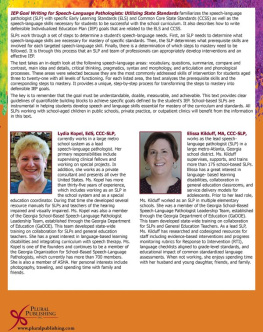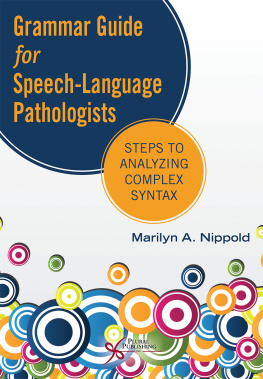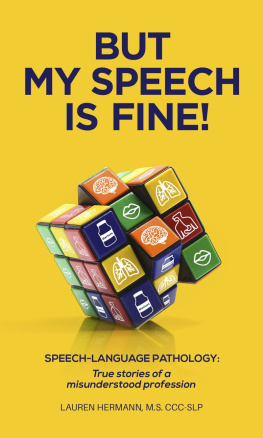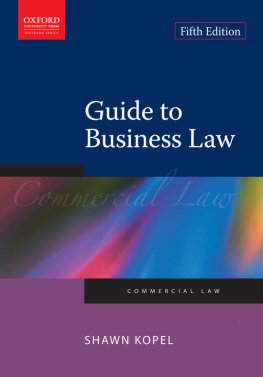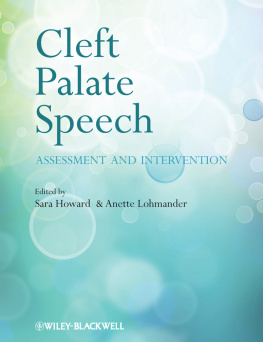Kopel Lydia editor - IEP Goal Writing for Speech-Language Pathologists
Here you can read online Kopel Lydia editor - IEP Goal Writing for Speech-Language Pathologists full text of the book (entire story) in english for free. Download pdf and epub, get meaning, cover and reviews about this ebook. year: 2016, publisher: Plural Publishing, genre: Home and family. Description of the work, (preface) as well as reviews are available. Best literature library LitArk.com created for fans of good reading and offers a wide selection of genres:
Romance novel
Science fiction
Adventure
Detective
Science
History
Home and family
Prose
Art
Politics
Computer
Non-fiction
Religion
Business
Children
Humor
Choose a favorite category and find really read worthwhile books. Enjoy immersion in the world of imagination, feel the emotions of the characters or learn something new for yourself, make an fascinating discovery.
- Book:IEP Goal Writing for Speech-Language Pathologists
- Author:
- Publisher:Plural Publishing
- Genre:
- Year:2016
- Rating:5 / 5
- Favourites:Add to favourites
- Your mark:
- 100
- 1
- 2
- 3
- 4
- 5
IEP Goal Writing for Speech-Language Pathologists: summary, description and annotation
We offer to read an annotation, description, summary or preface (depends on what the author of the book "IEP Goal Writing for Speech-Language Pathologists" wrote himself). If you haven't found the necessary information about the book — write in the comments, we will try to find it.
IEP Goal Writing for Speech-Language Pathologists — read online for free the complete book (whole text) full work
Below is the text of the book, divided by pages. System saving the place of the last page read, allows you to conveniently read the book "IEP Goal Writing for Speech-Language Pathologists" online for free, without having to search again every time where you left off. Put a bookmark, and you can go to the page where you finished reading at any time.
Font size:
Interval:
Bookmark:
Elissa Kilduff, MA, CCC-SLP


5521 Ruffin Road
San Diego, CA 92123
e-mail: info@pluralpublishing.com
Website: http://www.pluralpublishing.com
Copyright 2016 by Plural Publishing, Inc.
Typeset in 12/16 Palatino by Flanagans Publishing Services, Inc.
Printed in the United States of America by McNaughton & Gunn, Inc.
All rights, including that of translation, reserved. No part of this publication may be reproduced,stored in a retrieval system, or transmitted in any form or by any means, electronic, mechanical,recording, or otherwise, including photocopying, recording, taping, Web distribution, or informationstorage and retrieval systems without the prior written consent of the publisher.
For permission to use material from this text, contact us by
Telephone: (866) 758-7251
Fax: (888) 758-7255
e-mail: permissions@pluralpublishing.com
Every attempt has been made to contact the copyright holders for material originally printed in another source. If any have been inadvertently overlooked, the publishers will gladly make the necessary arrangements at the first opportunity.
Library of Congress Cataloging-in-Publication Data
Names: Kopel, Lydia, author. | Kilduff, Elissa, author.
Title: IEP goal writing for speech-language pathologists utilizing state
standards / Lydia Kopel, Elissa Kilduff.
Description: San Diego, CA : Plural Publishing, Inc, [2016] | Includes
bibliographical references and index.
Identifiers: LCCN 2015046758| ISBN 9781597569415 | ISBN 1597569410
Subjects: | MESH: Language Disorders rehabilitation | Speech-Language Pathology methods | Education standards | Goals | Child | Adolescent |
United States
Classification: LCC RC428 | NLM WL 340.2 | DDC 616.85/50071 dc23
LC record available at http://lccn.loc.gov/2015046758
As speech-language pathologists (SLPs), we have a responsibility to support the state standards. In order for students to be successful with the standards, they must have mastered specific speech-language skills. There are three objectives of this book. First, to familiarize the SLP with specific Early Learning Standards and Common Core State Standards (CCSS) and the speech-language skills needed to be successful with these standards. The second objective is to outline prerequisite speech-language skills and steps to mastering those skills. The third objective, through a step-by-step process, is to write defensible IEP goals that are related to the standards.
The information and process provided in this book are based on research, fifty years of combined experience as school-based SLPs and administrators, and reviewing Individualized Education Programs (IEPs) from all over the country. The authors developed this book as a result of reading hundreds of IEPs that had goals and objectives that were difficult to implement as written. This process has been field tested through a large metro school system with more than 175 SLPs.
Early Learning Standards are the developmental building blocks for success in school. These are focused on in year olds. They are divided into the areas of Communication and Literacy, Math, Science, Social Studies, Cognition, Approaches to Learning, and Social and Emotional.
The CCSS ( Standards have been pulled from all areas including English Language Arts, Literacy in History/Social Studies, Science, Technical Subjects, and Mathematics. The standards are organized by grade level. Within each grade level the standards are organized by Common Core area, numbers, as indicated in the CCSS, and specific prerequisite speech and language skill(s) for that standard.
The Early Learning Standards can easily be compared to the Early Learning Standards from each state. In addition, for those SLPs whose state or school system has not adopted the Common Core State Standards, these can be compared to their adopted standards. This process can assist SLPs in identifying target skills within those standards.
. Each Prerequisite Skill then has corresponding Steps to Mastery that should be achieved in order to succeed with the state standards. The Steps to Mastery are a hierarchy of levels from easiest to most difficult that should be accomplished for mastery of each Prerequisite Skill.
Once the SLP has identified the curriculum areas and specific standards that a student is struggling with, the Early Learning Standards in defensible IEP goals. The components of this framework include ensuring that the goals are understandable, doable, measurable, and achievable. An example of the goal writing process is included below.
D.J., 5th Grader Classroom teacher reports that D.J. is having trouble with main idea and supporting details.
- Identify the 5th-grade CCSS in that align with the skills of main idea.
- and look at all the Prerequisite Skills. The skills listed are:
- Comprehending questions
- Sequence
- Main idea when stated
- Important versus unimportant details
- Infer/draw conclusions
- Main idea and supporting details
- Decide where the student is currently functioning. In this case, D.J. can answer questions and sequence. That means he would start with main idea when stated.
- Starting with main idea when stated, look at all the Steps to Mastery under each of the subsequent Prerequisite Skills.
- Decide how many steps D.J. can reasonably achieve in the course of the IEP. In this case, it is believed that D.J.can get partway through the main idea and supporting details Steps to Mastery; up to Identify
 details that support a given main idea in a ______ (paragraph, story, poem, chapter, etc.). Write the goal using the Goal Writing Worksheet.
details that support a given main idea in a ______ (paragraph, story, poem, chapter, etc.). Write the goal using the Goal Writing Worksheet. - D.J. will state three details that support a given main idea in a grade-level passage when read aloud to him in four out of five opportunities using data collection.
This book focuses on skills for mastery, not on activities. The activities will).
The concentration of this book is spoken language (receptive language, and expressive language) and articulation. Reading and writing are addressed through highlighting the underpinning language skills of reading as part of spoken language intervention. SLPs should not be working on listening comprehension in the absence of reading material or oral expression in the absence of writing.
This is not intended to be an exhaustive list of speech-language skills. It is intended to target the common skills that SLPs focus on in the school system. There are many other skills that can be addressed as goals on a students IEP. The key to remember is that the goal must be understandable, doable, measureable, and achievable. Goals are an ending point, not a beginning point.
Font size:
Interval:
Bookmark:
Similar books «IEP Goal Writing for Speech-Language Pathologists»
Look at similar books to IEP Goal Writing for Speech-Language Pathologists. We have selected literature similar in name and meaning in the hope of providing readers with more options to find new, interesting, not yet read works.
Discussion, reviews of the book IEP Goal Writing for Speech-Language Pathologists and just readers' own opinions. Leave your comments, write what you think about the work, its meaning or the main characters. Specify what exactly you liked and what you didn't like, and why you think so.

